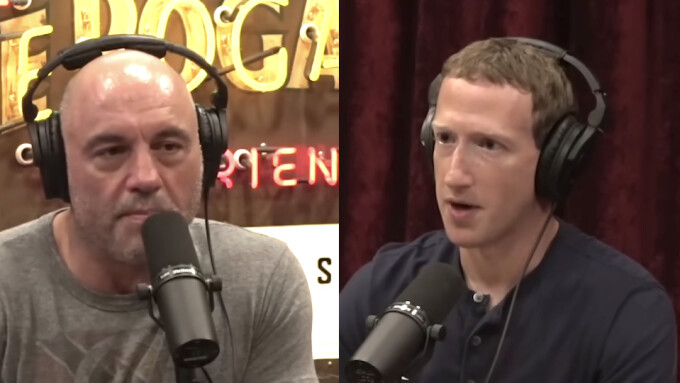MENLO PARK, Calif. — During a recent interview, Facebook founder, Instagram owner and Meta CEO Mark Zuckerberg doubled down on his platforms' total ban on “pornography” and flatly denied the existence of “shadowbans” against specific users.
The rambling three-hour interview, which took place on Joe Rogan's Spotify podcast, was called by The Independent’s reviewer, “one of the most excruciating things I’ve ever seen.”
Zuckerberg pontificated on a variety of topics, including his background, the history of his material and professional success, his self-image now and his predictions for a metaverse-intensive future.
At one point during the chat, Rogan pressed Zuckerberg on his companies’ moderation policies, especially concerning free speech, which for the podcaster, comedian and MMA announcer mostly involves the deplatforming of his friends and associates from the political right.
Twitter vs. Meta
Rogan was also particularly interested in Zuckerberg’s opinion about Twitter, which is currently at the center of a debate involving would-be purchaser Elon Musk, Rogan’s friend. Zuckerberg demurred from commenting, stating that he is “not super deep on Twitter's policies.”
“Twitter has pornography,” Rogan said out of the blue. “I mean, they have hardcore pornography. You could just accidentally stumble onto someone you follow's page and they'll have hardcore pornography.”
“Pornography is a thing that we don't allow,” Zuckerberg decreed with automated precision. “I think it's somewhat controversial because, I mean, you could make a pretty good argument, I think, that this isn't doing physical harm to people. I know that there's arguments on both sides of that, so I don't want to go super deep on that, but I'd say our reason for not wanting pornography is more for the feel of the community than the sense of harm.”
Zuckerberg's companies' terms of service define “pornography” to include any images of “female nipples,” and lump it together with content featuring violence, terrorism and self-harm.
The Meta CEO added, “Obviously, child pornography is different. That's obviously real harm, but I think that's one category of content where it's kind of more of an editorial moderation decision. I don't think it's a political decision.”
Expanding on why Meta platforms reject “pornography,” Zuckerberg said, “We want the feel of the service to be about people connecting with their friends and family and not necessarily coming across that kind of content.”
In Zuckerberg’s opinion, “Most of the stuff that I think gets taken down, actually most people would agree needs to get taken down. Then I think there's mistakes and then there's stuff like how do you handle misinformation, which I think society as a whole doesn't agree on.”
Shadowbans? What Shadowbans?
Rogan then pressed Zuckerberg on the topic of “shadowbans,” which erase individual users from searches, autofills and even appeals forms. This phenomenon has been experienced by a variety of users, from political commentators to virtually every sex worker, including adult performers.
“One thing that people freak out about, and oftentimes I'm a little skeptical of their concerns, is people think they're being shadowbanned always,” Rogan said with some trepidation. “People think they're being shadowbanned. Is shadowbanning a real thing and what does that mean?”
“There's no policy that is ‘shadowbanning,’” Zuckerberg claimed. “I think it's sort of a slang term, but that maybe refers to some of the demotions that we're talking about. If someone posts something that gets marked as false by a fact checker, then it'll get somewhat less shown in the feed.”
“Just that post or all of their posts for the future?” Rogan asked.
“If you do it once, then it's that … there's kind of different rules for pages and groups and different things. Then there can be some kind of broader policy that applies, but when I look into this stuff — a lot of my friends and people I know just send me examples, because unfortunately there are a lot of mistakes.”
To the likely surprise of thousands of sex workers who may have felt like they were being gaslit by one of the world’s wealthiest and most powerful men, Zuckerberg then added with a straight face, “As it relates to concerns about shadowbanning, a lot of the time when I look into stuff, people attribute some motive or Meta has some stupid policy in place that blocked this, or they're banning this thing. A lot of the time it was either just a mistake, so nothing was supposed to happen, but there was some bug in the system or some system didn't work the way it was supposed to, which is a real issue, but it's not an ideological issue.”
'Just Work Out'
The Meta CEO added that some perceived shadowbanning might be explained this way: “Maybe their post just wasn't as good or something, and it just didn't get the distribution that they wanted it to.”
After discussing a specific example of a friend of Rogan’s that Zuckerberg had looked into, the podcaster suggested that people are responding to “a lack of transparency as to how does this all work. They assume there's nefarious intentions and that someone's censoring them.”
Zuckerberg attempted to get the host to empathize with him.
“I’m curious how you'd think about this if you were in my position,” he pled, without a hint of emotion in his delivery.
“I’ve thought about it,” Rogan admitted. “I imagine it would be incredibly overwhelming, and I'd probably be on Xanax. I don't know.”
“Or you'd just work out more,” counseled Zuckerberg, who visibly buffed out his scrawny programmer’s physique as he entered middle age. “Just work out.”








